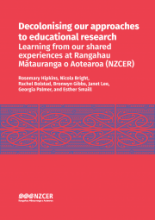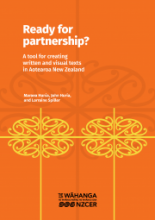Tāia te wai (o te waka) kia pai ai te whakatere ki uta ki tai
Bail the water (of the canoe) so it may manoeuvre shoreward and seaward
E noho ana te te whakakorenga o te mahi tāmi, te purenga ihomatua rānei hei whakaarotau rautaki mō Rangahau Mātauranga o Aotearoa. Ka tika hoki Te Tiriti o Waitangi hei anga mō te mahi pātui a ngāi Māori me tauiwi ki te pure ihomatua mō te mātauranga. I Aotearoa, ka pā pea te purenga ihomatua ki te turakitanga o ngā pūnaha tāmi mai i tāwāhi, me te wero ki ngā pūtake kaha ka pā kino ki a ngāi Māori. Otirā, mā te purenga ihomatua ka hua ake pea ētahi ara mō te panonitanga pāpori ka whai hua mō te Māori, otirā mō ngā iwi katoa o Aotearoa.
Decolonising education is a strategic priority for NZCER, and Te Tiriti o Waitangi provides a framework for both Māori and non-Māori to work in partnership to decolonise education. In Aotearoa, decolonising education can refer to dismantling colonial systems, and challenging power dynamics and ways of thinking that negatively impact Māori. At the same time, decolonising education can also offer possibilities for social transformation that benefit Māori, and ultimately all peoples of Aotearoa.
Te purenga ihomatua i te ao mātauranga | Decolonising Education research project
He kaupapa motuhake tā Rangahau Mātauranga o Aotearoa, ko tōna ingoa Te Purenga Ihomatua, Decolonising Education, e noho ana i waenga i tētahi kāpuinga mahi whānui kē atu hei whakakorikori i tō mātou whakaarotau rautaki, o te purenga ihomatua. Ko te aronga o te kaupapa he tūhura i te tikanga o te purenga ihomatua, me ōna pānga ki ngā wāhanga katoa o ngā mahi a Rangahau Mātauranga o Aotearoa me te mahi o te rangahau mātauranga whānui kē atu. Ka kitea ētahi atu kōrero i te whārangi kaupapa.
NZCER has a specific project, named Te Purenga Ihomatua, Decolonising Education, that sits within the larger set of activities that give life to our strategic priority of decolonising education. The current focus of the project is to explore the meaning(s) of decolonisation, and its implications for every aspect of NZCER’s work and the work of the wider education sector. More detail can be found on the project page.
He kohinga rauemi | A collection of resources
Kua whakahiatotia ētahi rauemi e ngā tira rangahau o Rangahau Mātauranga o Aotearoa e hora mōhiotanga nei, e tautoko nei hoki i te tangata kia kawea te purenga ihomatua i roto i ō rātou whakaaro i te huhua o ngā kaupapa, pēnei i te whakarauoratanga o te reo Māori, te hauora me te toiora, me te whakawhanake rauemi. Kei te ripanga i raro iho nei ētahi whakamārama poto mō ngā rauemi me ngā hononga. Ka tāpiritia ētahi rauemi hou ki tēnei kohinga ina wātea mai.
The research teams at NZCER have developed resources that provide information and support people to take a decolonising lens to their thinking in a range of areas including reo Māori revitalisation, health and wellbeing, and resource development. The table below provides brief descriptions of the resources and links. New resources will be added to this collection as they become available.
| Description | Resource |
|---|---|
|
Decolonising our approaches to educational research—Learning from our shared experiences at Rangahau Mātauranga o Aotearoa (NZCER) |
Working paper |
|
Definitions and uses of the term “decolonisation”—A brief overview of key literature |
Literature review |
|
Ready for partnership? A tool for creating written and visual texts in Aotearoa New Zealand Ready for Partnership? will help you to create written or visual texts which welcome ākonga Māori. We hope that this tool will give you ways of reflecting on texts as you create them, before you then go on to do further work with kaupapa Māori colleagues |
Ready for Partnership? |
|
Hei whakaarotanga: Engaging with models of health and wellbeing that draw on mātauranga Māori Tā tēnei pepa he tāpae i tētahi kāpuinga pātai huritao hei arataki i te kaipānui, i a ia e whiriwhiri ana i te pātai, e tika ana rānei ngā tauira hauora, toiora i takea mai i te mātauranga Māori mō ngā mahi e mahia ana e rātou (wh 25-26). The paper provides a set of reflective questions to guide the reader as they consider whether models of health and wellbeing that draw on mātauranga Māori are the right fit for the work they are doing (pp. 25-26). |
Hei whakaarotanga: Engaging with models of health and wellbeing that draw on mātauranga Māori |
|
Ētahi pātai huritao hei tautoko i ngā matapaki arohaehae: He taputapu mā ngā pou reo | Reflective questions to support critical conversations: A tool for pou reo. He mea āta hoahoa ēnei pātai huritao hei tautoko i ngā pou reo kia haere ētahi matapaki arohaehae i roto i ngā kura mō ngā take me ngā kaupapa e mōhiotia ana he mea hira, ina whakamaheretia he ara rautaki hei whakatupu i te reo Māori. The reflective questions have been designed to support pou reo to have critical conversations in schools about issues and kaupapa that are important to consider when strategically planning to grow te reo Māori. |
He reo ka tipu i ngā kura - Reflective questions for pou reo |
|
Manaakitia ngā tamariki kia ora ai Supporting children’s wellbeing Learning from the experiences of six good-practice schools Ētahi atu rauemi (wh 95) Aotearoa New Zealand:
Additional Resources (p 95) Aotearoa New Zealand:
|
Manaakitia ngā tamariki kia ora ai - Full report |
|
He arotakenga hohoro mō te kaikiri i roto i ngā kura: Pepa mahi | A rapid review of racism in schools: Working paper Ko tēnei tuhinga he pepa e mahia ana hei whakamārama i ngā hātepe whakatau take mō te tāpiritanga ā tōna wā o ētahi tūemi tāpiri mō ngā taputapu uiui o Wellbeing@School He tirohanga hohoro tēnei ki ngā tuhinga taketake o ēnei tau tata, tae atu ki ngā tātaritanga whānui, me ngā tuhinga mai i Aotearoa e hāngai ana, e whakautu nei i ēnei pātai:
This document is a working paper to inform the decision process about possible additional items for Wellbeing@School survey tools. It is a rapid review of recent key literature including meta-analyses and relevant New Zealand Aotearoa literature that addresses the following questions:
|
A rapid review of racism in schools: Working paper |







